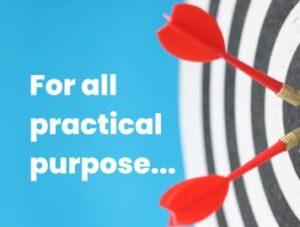“I don’t know. I can’t think of what I need from our session today”. Both coaches and clients alike experience this from time to time during a session, even in the most committed coaching relationships. I know I have, both as a coach and as a client.
This article aims to answer a question that should be the prerogative of both coach and client upon getting into a coaching agreement – “what should I bring as a topic to my coaching session to get the maximum value from my time?”

This is key, because in the coaching relationship, bringing a topic to each session is the client’s responsibility.
So, let’s understand how topics can be generated. There are several, and here’s some which may be relevant at different stages of the coaching timeline and how they can really help hit the crucial, sometimes scary areas necessary for growth:
Initial stages of coaching
- A well executed discovery session, where both coach and client discuss the vision behind the goals you are bringing to coaching. This is the BIG picture. This is non negotiable, because experience has shown us that as you evolve in the coaching journey, your original milestones and goals change to reflect this metamorphosis. If you are clear on your BIG picture, your topic will stand the litmus test by asking “How is this connecting to the vision behind my goals?” Who am I daring to be when I explore this topic?
- Having a conversation around the answer to “How will you know you are there?”. Most of the time we can feel what we want. We can even sense it. But we cannot articulate it. Because of this, many ideas and actions remain in the land of good ideas. To be able to get what we want, especially from esoteric terms like “Happiness”, “More effective decisions”, “More confidence”, you need to work on spelling out with your coach what these really translate to in real life, and where you are stuck or challenged with them. In many ways, this compels us to ask a very daring question to ourselves “What do I really want?”
- Having a clear list of areas to work on from the initial conversation. When describing our vision of what we want out of coaching, we will often encounter many metaphoric characters along the way. Let’s call these “Saboteurs” – An important coaching term (source: Co-Active Training Institute). Limiting assumptions, beliefs and perspectives around our intentions and dreams hold us back from achieving them. Your coach will be able to help you articulate these as areas of work and topics up front. In other words, bringing in a topic about what we don’t want any more, will force us to open a new bold avenue of our inner leadership and its narrative.
Once the fundamentals are in place, where else can you mine for topics?
Mid way through the coaching relationship
"Real life is what happens when we are busy making plans" John Lennon
- Most clients have high energy to work on a particular goal initially – mostly a doing / action goal. And then suddenly, a child falls sick, a team member resigns, you hurt your back while working out. And right there, all our ‘doing’ plans fall apart. Perhaps the initial reaction is to postpone the session or even give up on the goal. Sure, if it’s an emergency, pivoting is a skill that coaching can actually help you achieve. Make use of these ‘gifts of discomfort’ with your coach by bringing topics on specific areas that you are currently challenged with, and trust them to ask all the questions to help you find your resourcefulness and connection to the big vision.
What can I bring as a topic to my coach which can help me right now? ...And trust your coach to find a way to help you through it and for you to find a bigger meaning to your immediate experience.
- Clients who understand the meaning of accountability in coaching and coaches who design this impactfully get the most out of their joint coaching experience. Clients – you won’t always do your homework. It’s a fact. Understand that your coach isn’t married to you doing ‘homework’. Accountability and homework in coaching is an opportunity which you, client, provide yourself with, to witness the commitment you want to make to yourself. Anything can happen from this perspective as long as both coach and client are committed to learning from the experience. Your relationship to failure, abundance, perfectionism and who you are may come up as new topics as a result of this perspective.
Click here for a handy tool which I use / share with all my clients who have a hard time preparing for a coaching session
What not to do:
- Don’t cancel a session because you don’t have a topic – Bring it up with your coach. We are skilled to help you articulate a topic in the first 10 minutes of a conversation if you are genuinely struggling with it.
- Don’t get up 5 minutes before your session to prepare. Have a 10 minute preparation period 2-3 days prior to your session to reflect on your experience between sessions and the insights you want to bring up with your coach. Chances are you will have a topic waiting for you right there.
- Don’t ignore your pattern of showing up without a topic – Your coach will probably call you on it in 2-3 sessions and ask you what’s going on. It could mean a conversation with your coach on what’s going on and perhaps redesigning how you are working together.
Do let me know if you found this helpful. I’d love to hear from you. Click this link to drop me an email. What are some of the other areas in coaching you’d like to know more about.









